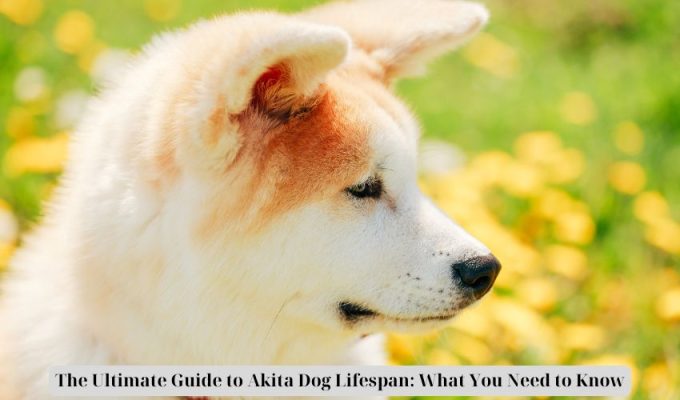Discover everything you need to know about Akita dog lifespan in our ultimate guide.
Understanding Akita Dog Lifespan
Akitas are known for their surprisingly long lifespan, especially for such a large breed. On average, Akitas live between 10 and 14 years, which is longer than many other large dog breeds. This means that when you bring an Akita into your home, you should be prepared for a long-term commitment. It’s important to provide them with the proper care, nutrition, and veterinary attention to ensure they live a healthy and fulfilling life.
Factors Affecting Lifespan
– Genetics: Like all living beings, genetics play a significant role in determining an Akita’s lifespan. It’s important to inquire about the health history of an Akita’s parents before bringing one home.
– Nutrition: Providing a high-quality diet and proper nutrition is essential for promoting longevity in Akitas. Consult with a veterinarian to determine the best diet for your Akita based on their age, size, and health conditions.
– Exercise and Mental Stimulation: While Akitas don’t require excessive exercise, providing them with regular physical activity and mental stimulation can contribute to their overall health and lifespan.
– Veterinary Care: Regular veterinary check-ups, vaccinations, and preventative care can help identify and address any health issues early on, potentially extending an Akita’s lifespan.
By understanding the factors that contribute to an Akita’s lifespan, owners can take proactive measures to ensure their beloved pets live long and healthy lives.
How to Care for an Akita Dog to Maximize Lifespan
Regular Veterinary Visits and Health Maintenance
Regular veterinary check-ups and vaccinations are essential for maximizing the lifespan of your Akita dog. Annual eye exams are important to check for any signs of eye disorders, and your veterinarian can also test for thyroid disorders, such as autoimmune thyroiditis. Additionally, it’s crucial to be aware of the symptoms of bloat, a serious and potentially life-threatening condition that can affect larger breeds like Akitas. Prompt veterinary care is necessary if you suspect your dog may have bloat.
Proper Nutrition and Exercise
A well-balanced, high-quality diet is important for the health and longevity of your Akita. Consult with your veterinarian to determine the best diet for your dog based on their age and size. It’s also crucial to provide regular exercise and mental stimulation for your Akita. While they don’t require excessive exercise, a brisk walk or slow jog once or twice a day, along with games and mental stimulation, can help keep them healthy and happy.
Regular Grooming and Dental Care
Akitas have moderate grooming needs, including regular brushing and occasional shedding of their undercoat. It’s important to maintain their coat to keep them looking their best and to minimize shedding around the home. Additionally, regular dental care, including daily brushing with a dog-friendly toothpaste, is essential for their overall health and can contribute to a longer lifespan.
Tips for Prolonging the Lifespan of an Akita Dog
Regular Exercise and Mental Stimulation
Akitas don’t require excessive exercise, but regular physical activity is important for their overall health and well-being. Take your Akita for daily walks or engage in low-impact activities to keep them fit. Mental stimulation is also crucial, so provide them with interactive toys and engage in training sessions to keep their minds sharp.
Healthy Diet and Weight Management
A balanced and nutritious diet is essential for maintaining your Akita’s health. Consult with your veterinarian to determine the right type and amount of food for your dog based on their age, size, and activity level. Monitor their weight and ensure they maintain a healthy body condition to prevent obesity-related health issues.
Regular Veterinary Check-ups and Vaccinations
Schedule regular visits to the veterinarian for comprehensive check-ups, vaccinations, and preventive care. Akitas are prone to certain health issues, so early detection and treatment can significantly impact their lifespan. Stay up to date with vaccinations and preventive medications to protect your dog from common diseases and parasites.

Signs of Aging in Akita Dogs
As Akita dogs age, there are several signs that may indicate they are entering their senior years. One common sign of aging in Akitas is a decrease in energy levels. Older Akitas may not be as active as they once were and may prefer to spend more time resting. Additionally, you may notice that your Akita is not as eager to play or engage in physical activities as they used to be.
Physical Changes
As Akitas age, they may experience physical changes such as a decrease in muscle mass and strength. You may notice that your Akita is not as agile or mobile as they once were, and they may have difficulty getting up or climbing stairs. Joint stiffness and arthritis are also common in aging Akitas, which can affect their mobility and comfort.
Changes in Behavior
Aging Akitas may exhibit changes in behavior, such as increased irritability or anxiety. They may also become more vocal or display signs of confusion or disorientation. Additionally, older Akitas may experience changes in their sleep patterns, including difficulty falling asleep or staying asleep through the night.
It’s important to monitor your aging Akita for any signs of discomfort or changes in behavior, and to consult with a veterinarian if you have any concerns about their health and well-being. Regular veterinary check-ups and preventive care can help ensure that your Akita remains healthy and comfortable as they age.
Coping with the Loss of an Akita Dog
Losing a beloved pet, especially an Akita, can be a devastating experience. Akitas are known for their loyalty and strong bond with their owners, so the loss can be particularly difficult to cope with. It’s important to allow yourself to grieve and process the loss in your own time. Surround yourself with supportive friends and family who understand the depth of your connection with your Akita.
Seek Support
Reach out to support groups or online communities that focus on pet loss and grieving. Talking to others who have experienced similar loss can provide comfort and understanding. Consider seeking professional help if you find yourself struggling to cope with the loss of your Akita. A therapist or counselor can provide guidance and support as you navigate through your grief.
Remember and Honor
Create a memorial or tribute to honor your Akita’s memory. This could be a special photo album, a piece of artwork, or planting a tree in their honor. Allow yourself to reminisce about the happy times you shared with your Akita and celebrate the impact they had on your life. It’s okay to feel the pain of loss, but also important to cherish the joyful memories.
In conclusion, the Akita dog has a lifespan of around 10 to 15 years. Proper care, nutrition, and regular vet check-ups can help to ensure a longer and healthier life for this majestic breed.



